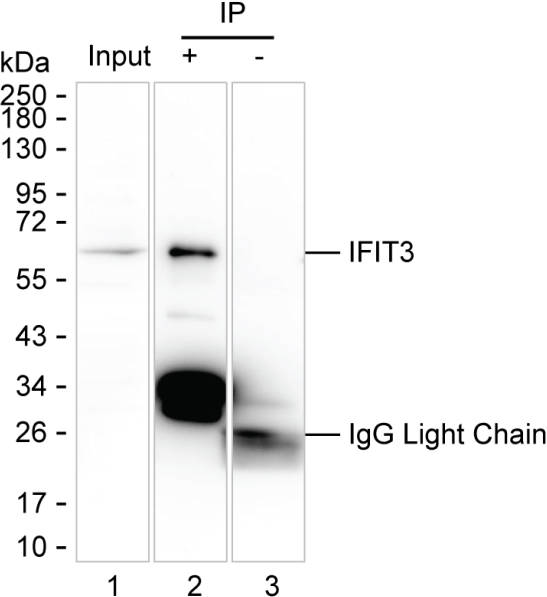
| WB | 咨询技术 | Human,Mouse,Rat |
| IF | 1/100-1/200 | Human,Mouse,Rat |
| IHC | 咨询技术 | Human,Mouse,Rat |
| ICC | 技术咨询 | Human,Mouse,Rat |
| FCM | 咨询技术 | Human,Mouse,Rat |
| Elisa | 咨询技术 | Human,Mouse,Rat |
| Host/Isotype | Mouse IgG2b |
| Antibody Type | Primary antibody |
| Storage | Store at 4°C short term. Aliquot and store at -20°C long term. Avoid freeze/thaw cycles. |
| Species Reactivity | Human |
| Immunogen | Purified recombinant fragment of human IFIT3 |
| Formulation | Purified antibody in PBS with 0.05% sodium azide |
+ +
以下是关于IFIT3抗体的3篇参考文献及其摘要概括:
1. **文献名称**:*IFIT3 inhibits viral infection by promoting apoptosis of infected cells*
**作者**:Yang, Z. et al.
**摘要**:该研究揭示IFIT3通过激活内质网应激通路,诱导病毒感染细胞的凋亡,从而抑制病毒扩散。研究使用特异性IFIT3抗体验证其在宿主细胞中的蛋白表达及定位。
2. **文献名称**:*Interferon-induced protein IFIT3 modulates innate immune response through interaction with STAT1*
**作者**:Liu, X. et al.
**摘要**:文章阐明IFIT3通过结合STAT1增强干扰素信号通路,促进抗病毒基因表达。实验通过IFIT3抗体进行免疫共沉淀(Co-IP),证实其与STAT1的相互作用机制。
3. **文献名称**:*High expression of IFIT3 in colorectal cancer correlates with immune infiltration and poor prognosis*
**作者**:Wang, H. et al.
**摘要**:研究发现结直肠癌中IFIT3的高表达与免疫细胞浸润及患者不良预后相关。利用IFIT3抗体进行免疫组化分析,证实其作为潜在生物标志物的价值。
4. **文献名称**:*IFIT3-mediated antiviral response against SARS-CoV-2 is regulated by viral protease activity*
**作者**:Zhang, Y. et al.
**摘要**:研究指出IFIT3通过干扰病毒复制复合体抑制SARS-CoV-2感染,但病毒蛋白酶可降解IFIT3以逃逸宿主防御。研究采用IFIT3抗体进行Western blot验证其表达水平变化。
以上文献均涉及IFIT3抗体的应用,涵盖抗病毒机制、癌症关联及宿主-病原体相互作用等领域。
IFIT3 (Interferon-Induced Protein with Tetratricopeptide Repeats 3), also known as ISG60. is a member of the IFN-inducible IFIT family. It is strongly upregulated in response to type I and III interferons (IFNs) during viral infections, playing a critical role in innate immunity. IFIT3 acts as a key mediator of antiviral defense by inhibiting viral replication through multiple mechanisms, including binding viral RNA, disrupting viral protein synthesis, and modulating host signaling pathways (e.g., NF-κB, RIG-I/MDA5). Its expression is closely associated with immune activation in viral infections (e.g., influenza, SARS-CoV-2), autoimmune disorders, and cancers.
IFIT3 antibodies are essential tools for studying its expression, localization, and function in immune regulation. These antibodies are widely used in techniques like Western blotting, immunofluorescence, and immunohistochemistry to detect IFIT3 in cell lines, tissues, or clinical samples. High-quality IFIT3 antibodies exhibit specificity validated via knockout controls and distinguish IFIT3 from homologous family members (e.g., IFIT1. IFIT2). Applications include research on antiviral responses, tumor immunology, and therapeutic targeting. Commercially available IFIT3 antibodies are typically developed in hosts like rabbits or mice, with formats ranging from monoclonal to polyclonal, catering to diverse experimental needs. Proper validation ensures reliability in both qualitative and quantitative analyses.
×